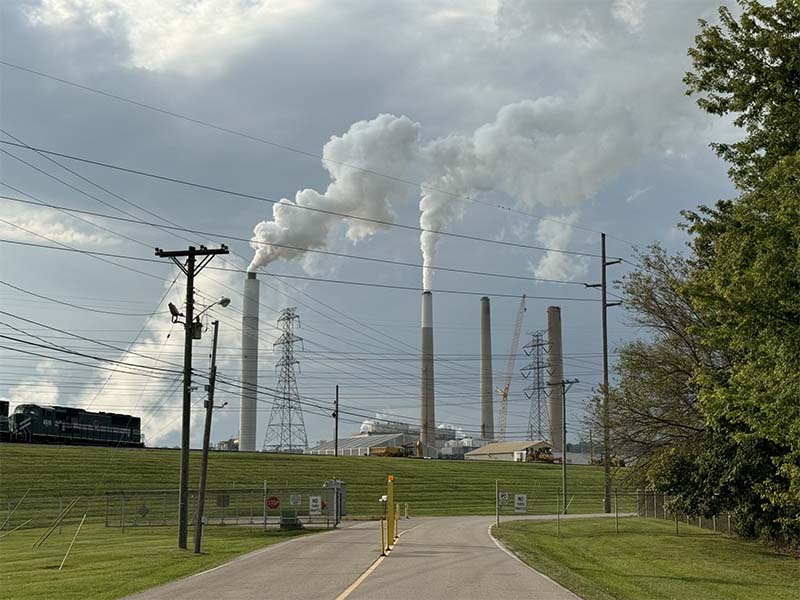By Sarah Ladd
Kentucky Lantern
Kentuckians stand to lose more years off their lives due to power plant emissions than residents of almost any other state, according to a first of its kind national report released Thursday.
In the Commonwealth Fund’s State Scorecard on Climate and Health, researchers ranked Kentucky as 50th overall among the 50 states and District of Columbia for health impacts of electricity generation emissions, flood risk posed to health care facilities, energy efficiency policies, health sector greenhouse gas emissions and more. Only West Virginia ranked lower.

Michael Seilback, the nationwide advocacy and state public policy expert at the American Lung Association, said the pollution in Kentucky’s air contributes to asthma attacks, lung cancers and premature death.
“When we turn on a light switch, we don’t often think about where that energy is coming from,” Seilback told the Lantern. “And what we’re talking about here is that these power plants that are fueled from coal — the burning of that coal to produce energy produces massive amounts of emissions.”
Kentucky’s longstanding loyalty to coal is “a major contributor to the state’s poor grade” in this report, Seilback said. About 68% of Kentucky’s electricity generation came from coal in 2023, the third-largest share among the states after West Virginia and Wyoming, according to the U.S. Energy Information Administration.
“Often we think about how much energy you’re using in your house, and that’s relevant, but the question is, ‘where is that energy coming from?’” Seilback said. “If you were able to say all of Kentucky was being powered through wind, solar, hydropower, there would be less of a concern about using electricity because you weren’t producing all those emissions.”
This report “should be another data point for decision makers to say ‘we really need to move away from fossil fuels and towards green energy, which will improve the health of Kentucky residents,’” Seilback said.
Cabinet for Health and Family Services data shows 12,266 people visited emergency departments in Kentucky for asthma treatment in 2024. There were more than 1,000 hospitalizations, as well, and 34 deaths related to asthma that same year. Air pollution can cause asthma, according to the Asthma and Allergy Foundation of America, as well as worsen its symptoms.

“The exposure to these pollutants are literally shortening people’s lives,” Seilback said.
Kentucky has the nation’s highest rates of cancer and lung cancer.
Among the eight indicators on which each state was evaluated, Kentucky ranked best on risks facing health care facilities from natural hazards, defined as vulnerability of health care facilities to natural hazards. “On average, health care facilities in Kentucky are located in areas facing less risk from natural hazards than facilities in other states,” the report states.
At the same time, Kentucky’s number of inpatient beds in high-hazard flood zones significantly raises the flood risk to the state’s health care facilities, according to the report.
Hawaii ranked worst on health harms from electricity generation, the report said, because of the islands’ high use of petroleum to generate power. Kentucky and West Virginia ranked next worst. The researchers quantified health effects of power plant pollution by using disability-adjusted life years (DALYs) — described as “a common measure of the burden of disease, representing years of healthy life lost” — to calculate “the standardized health burden for every unit of electricity generated.”
“In Kentucky, emissions from electricity generation result in more negative health impacts per unit of electricity than in other states,” the report says. “Negative health impacts are represented by years of healthy life lost.”
The commonwealth is joined by Louisiana and West Virginia as the worst-ranked states overall, meaning they “face more frequent and intense hazards and lack supportive energy and environmental policies.”
The highest ranking states in the report are Vermont, New York and Washington, meaning those states “have lower environmental risk and vulnerability as well as stronger decarbonization and clean energy policies.”
Dr. Joseph R. Betancourt, the president of the Commonwealth Fund, said in a statement that “I hope this scorecard inspires states to learn from one another’s efforts to reduce pollution, prepare for environmental risks, and better protect people’s health.”
“As a physician, I have seen firsthand how closely the environment and health are linked,” Betancourt said. “People are better off when they can breathe clean air and when the hospitals they depend on are prepared for extreme weather.”
Calls to action for Kentucky and beyond
The Commonwealth Fund, founded in 1918, is a private foundation seeking to improve the country’s health care system through independent research and grantmaking. The report recommends a series of policies for states and health systems to consider. They include:
• Prioritize decarbonizing energy sources and improving efficiency, through mechanisms like renewable portfolio standards and updated building energy codes, to reduce emissions and protect public health.
• Set health care decarbonization goals and incentivize performance improvement through payment reforms in Medicaid as well as private and employer insurance.
• Require standardized, verified and transparent reporting of greenhouse gas emissions, strategic planning, and mitigation targets by health care facilities and their suppliers.
• Prioritize building resilience to extreme weather; expand public health investment in relief centers and early warning systems, especially in high-risk areas.
• Assign executive-level sustainability responsibility and employ designated leaders at each health care facility.
• Collect and report sustainability and resilience data in areas prioritized by the Centers for Medicare and Medicaid Services and The Joint Commission.
• Purchase reusable and environmentally preferable products and champion waste reduction and clean energy.
Seilback, with the Lung Association, said the Trump administration’s moves to undo “many air quality protections” have put more responsibility on states to act.
“Without a strong federal government, we really need state and local bodies to step up,” he said. “We want to see more investments in the wide range of cleaner, greener technologies.”
Kentucky Lantern is part of States Newsroom, a nonprofit news network supported by grants and a coalition of donors as a 501c(3) public charity. Kentucky Lantern maintains editorial independence. Contact Editor Jamie Lucke for questions: info@kentuckylantern.com.





















